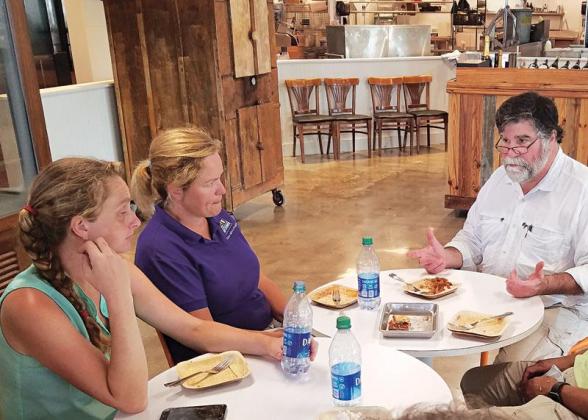
Rick Bogren
When New Orleans restauranteur Dickie Brennan was ready to find tomato varieties for his restaurants, he called on the LSU AgCenter.
“I want to serve, sell and promote local, vine-ripe tomatoes picked here — tomatoes that stay longer on the vine are sweeter and juicier,” he said.
Brennan recently opened a commercial kitchen called The Commissary to supply basics like soups and desserts to his company’s five restaurants. The facility also will include a market where customers can purchase packaged foods and fresh produce.
“We’ve been evolving the concept for years,” he said. And high on his list of seasonal produce to feature in the market is the tomato.
Tomatoes don’t have flavor like they used to, Brennan said, so he’s trying to identify older varieties and find local farmers to grow them.
“I want the best-tasting tomato I can find,” he said. “We want to feature the best at The Commissary.”
To help Brennan find those best tomatoes, LSU AgCenter vegetable specialist Kiki Fontenot started growing tomato seedlings in a greenhouse this winter and recruiting local farmers to put them in their fields.
“The LSU AgCenter is here to help Louisiana farmers in any we can, including variety trials,” she said. “Flavor plays a huge role in what consumers want.”
Chefs are asking for flavorful tomatoes, and they want to source them locally and help the local economy. “This is actually a perfect partnership,” she said.
Fontenot’s trials are focused on St. Bernard and Plaquemines parishes south of New Orleans. The soils there, she said, have produced outstanding tomatoes for years.
Although any tomato grown in Louisiana can be marketed as “Creole,” the term derived from tomatoes grown in those parishes generations ago.
“Near New Orleans we have the most incredible growing region,” Brennan said. “It’s a dream for our chefs to connect with our farmers.”
Brennan has been sourcing specialty food products, including seafood and produce, from local producers for many years. He continues to work with local growers to find a way for both the producer and restaurant to be profitable.
“You have commodity farmers, and you have boutique farmers,” he said. “It’s hard to be a boutique farmer. What we’re trying to do with these individuals is to help them be sustainable and to make a living.”
As part of his pursuit of a good-tasting tomato, Brennan and some of his employees joined horticulturists from the AgCenter on a visit to Matt Ranatza’s farm in Belle Chasse to harvest a selection of tomatoes and take them back to New Orleans for a taste testing.
As a cooperator with the AgCenter and a supplier to Brennan’s restaurants, Ranatza has a strong interest in producing top-quality, good-tasting produce.
“Instead of growing an heirloom from a different part of the country, we should be planting an heirloom that people grew up eating down here,” Ranatza said of his motivation for working with Fontenot. “I always like to keep learning.”
The tomatoes back in the ‘60s and ‘70s were different varieties than most farmers are now growing. “But we’ve lost flavor,” Brennan said.
“My hope is Matt and I can go get that old tomato that had a great taste,” he said. “We can pay more for it and we can get it on the menus and we can be proud of the old Creole tomato that he and I grew up eating.”
The AgCenter research has a role to play, too.
“We want to make sure our Louisiana growers have the information on the best-yielding, best-tasting, insect- and disease-tolerant tomatoes,” Fontenot said.
